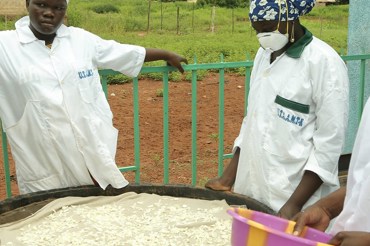Jennifer Mayer, Hutano Foods
In the eight years Jennifer has lived in Zimbabwe, she has been mainly involved in agriculture and market development. Today she owns Hutano Foods, which makes delicious, high-quality, snacks and porridges from local Zimbabwean ingredients like millet, sorghum, nyimo bean, marula, mongongo nuts, and baobab fruit. They source directly from about 300 small-scale farmers, increasing the value of the traditional foods. Hutano got started because Jennifer had become increasingly aware of a trend she noticed in the market.
“There are a lot of donors and NGOs talking about how everybody should be growing small grains or local legumes. These commodities perform better than maize, soybeans, and wheat, which is incredibly important when we are starting to see so much change in climactic rainfall patterns. But when you ask farmers to plant them, they say, ‘Why should I grow that? There’s no market for it.’ And then they get told, ‘Oh well, just grow it to eat in case your maize crop fails because of a drought.’ But then the farmers ask, ‘Why should I grow that when we don’t really want to eat it? It’s hard to process…’ and so on.”
This got Jennifer and her business partner thinking. “We realised this was part of a larger problem with two sides. These commodities do grow better for smallholders, but they have fallen out of favour. At the same time, you see consumers shifting to more highly processed foods like breads, salty and sugary snacks, fast foods, and all this unhealthy stuff, while the traditional foods that aren’t popular are so good for you! There was this disconnect,” she explained. “We started Hutano Foods to find a solution. One of the first things we thought of was to make a porridge from traditional grains. Porridge is something that everybody eats, but the market has been taken over by imported products that are so expensive that they are out of reach for most consumers, or otherwise the porridges are made from very-low-nutrient ingredients like maize and have next to nothing in them. Our porridge is affordable, nutritious, and tasty. And most importantly, it is produced from Zim-grown, climate-smart crops, which encourages more farmers to plant them.”
To Jennifer, the attraction of FemBioBiz was in all the non-monetary benefits. “When I heard about what FemBioBiz was about, I thought, ‘This is exactly the kind of thing we are looking for: not really the chance of investment, but the exposure to other ideas, advice, accelerator- or incubator-type services, and support. We really need to get out there to learn and grow.’ And the programme did exactly that for us. FemBioBiz was a chance to cut our teeth on a few key issues in our business model we had not really thought through yet, and then it was really just about the exposure to other female entrepreneurs. We all face so many similar issues, and it is truly helpful to hear how others deal with them.”






